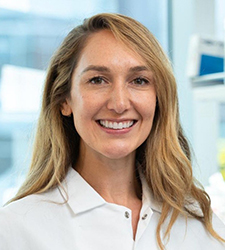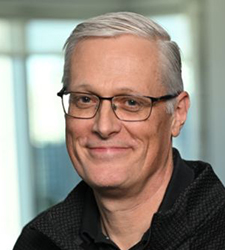
June 3, 2024
Enter the unfolding landscape of microfluidics, micro-compartmentalization strategies and organ-on-a-chip technologies. Learn about these and other scaled-down approaches to life sciences discovery as members share with SLAS Electronic Laboratory Neighborhood...
How has your lab integrated microscale innovations?

“To better predict the clinical success of our candidate drug molecules, we use cutting-edge organ-on-a-chip and other advanced cell-model technologies in conjunction with computational modelling and artificial intelligence (AI)/machine learning-driven models,” says Rhiannon David, Ph.D., director of Advanced Cell Models / Microphysiological Systems for AstraZeneca, R&D, Clinical Pharmacology and Safety Sciences (Cambridge, UK).
David, who also serves as co-chair for the SLAS 2024 Microscale Innovation in Life Sciences Symposium to be held September 11-12, 2024, at the AstraZeneca Discovery Centre (Cambridge, UK), continues: “Our advanced cell models (ACMs) span multiple tissue types, which we use to elevate the safety and efficacy of different drug modalities across numerous therapy areas. These innovative technologies help to enhance the human relevance of our pre-clinical safety and improve efficacy testing to ultimately reduce drug attrition and bring safer, more efficacious medicines to patients faster.”

Kendra Nyberg, Ph.D., group lead of microfluidics at Calico Life Sciences (San Francisco, CA, USA), and a program committee member for the upcoming SLAS microscale symposium, comments: "We live in an exciting era where computing and AI capabilities are advancing at an unprecedented rate. Yet, these advancements are inherently reliant on the ability to generate rich datasets for training.
“In biology, data generation at scale is particularly challenging. Microfluidics and microscale innovation are well positioned to address this,” Nyberg continues. “They enable such datasets through high-throughput workflows at single-cell resolution and recapitulating complex tissue-level behavior on organ-on-a-chip models. At Calico, we utilize these microfluidic technologies alongside advanced technologies and computing to unlock insights about aging. Ultimately, we aim to develop interventions that may help people live longer, healthier lives."

The lab of Julea Vlassakis, Ph.D., assistant professor of Bioengineering at Rice University (Houston, TX, USA), and co-chair for the SLAS2025 Micro- and Nano-technologies Track, designs and applies microscale assays to study pediatric cancer biology, specifically Ewing sarcoma, the second most common pediatric bone cancer.
“Our lab develops single-cell proteomic tools to better understand how proteins and their complexes play distinct roles in rapidly dividing versus spreading (metastasizing cells),” Vlassakis explains. “Characterizing the protein interactions in such cell populations will be critical to the rational development of therapeutics that target specific protein interactions present in Ewing sarcoma to improve survival of patients with metastatic disease and lessen the health impacts of treatment on survivors.
“Increasingly, our work involves designing microphysiological systems that mimic the bone tumor and metastasis site tissue composition, as Ewing sarcoma cells are highly sensitive to their tissue microenvironment. However, methods for characterizing protein signaling and protein interaction networks from single cells in such models are rather limited. Thus, we are designing readouts of single cells from microphysiological systems that leverage our expertise in microscale protein electrophoresis.”
As co-chair for SLAS2025, Vlassakis aims to highlight innovations in fabrication of microphysiological systems, applications of AI to high-throughput micro- and nanoscale systems, and the cutting-edge of fluidic handling at the smallest scales for use in lab screening to advance human health.

SLAS President Jonathan Wingfield, Ph.D., shares that within labs at AstraZeneca (Cambridge, UK), researchers are investing in the continued development of non-animal alternative models, such as ACMs, including organoids, organ-on-chip microphysiological systems (MPS), and the use of computer modelling, and AI/machine learning-driven models.
“These new approach methodologies (NAMs) are used at various stages of the drug discovery process and provide a range of evidence that can help further reduce or, in some instances, remove the need for selected animal studies,” says Wingfield, who is principal scientist of Mechanistic and Structural Biophysics, Discovery Sciences, R&D, at AstraZeneca. He adds that researchers also are actively developing ACMs for efficacy and safety assessments that include:
- Human cardiac microtissues that allow detection changes in cardiac structure at clinically relevant drug concentrations and provide insights into phenotypic mechanisms;
- A human kidney MPS, which is capable of mimicking clinically relevant release of kidney injury biomarkers when studying new therapeutics such as antisense oligonucleotides;
- A human bone marrow MPS that allows researchers to detect compounds that induce micronuclei – a marker of chromosome damage, including those only detected in animals and oncology drug-induced cytopenia. This bone marrow MPS study also presents an illustration of how MPS studies can benefit from a systematic evaluation of confounders to maximize power, efficiency and scalability; and
- Multi-organ disease models, which are in place for efficacy assessment, such as the group’s linked liver-pancreas MPS for diabetes with associated mathematical modelling for clinical translation.
“We’re working with other pharmaceutical companies to accelerate the adoption of NAMs,” Wingfield continues. “For example, we are authors on a recent cross-industry publication led by the IQ Consortium’s IQ MPS Affiliate, which details the progress and technological advancements needed to increase NAM adoption and decrease the need for animal studies.”
Sidelines
Summer Deadlines for the SLAS 2024 Microscale Innovation in Life Sciences Symposium!
- Podium and Poster Abstract Submission Deadline: Friday, July 19, 2024
- Early Bird Registration Rate Deadline: Monday, July 29, 2024
Explore Content for SLAS2025 in San Diego!
- Short Course proposals due: June 28, 2024
- Registration opens: August 2024
- Podium Abstracts, Innovation Award and Tony B. Travel Award (podium) submissions due: September 9, 2024
- Poster Award and Tony B. Travel Award (poster) due: September 16, 2024
- Innovation AveNEW (for startups) applications due: September 16, 2024
